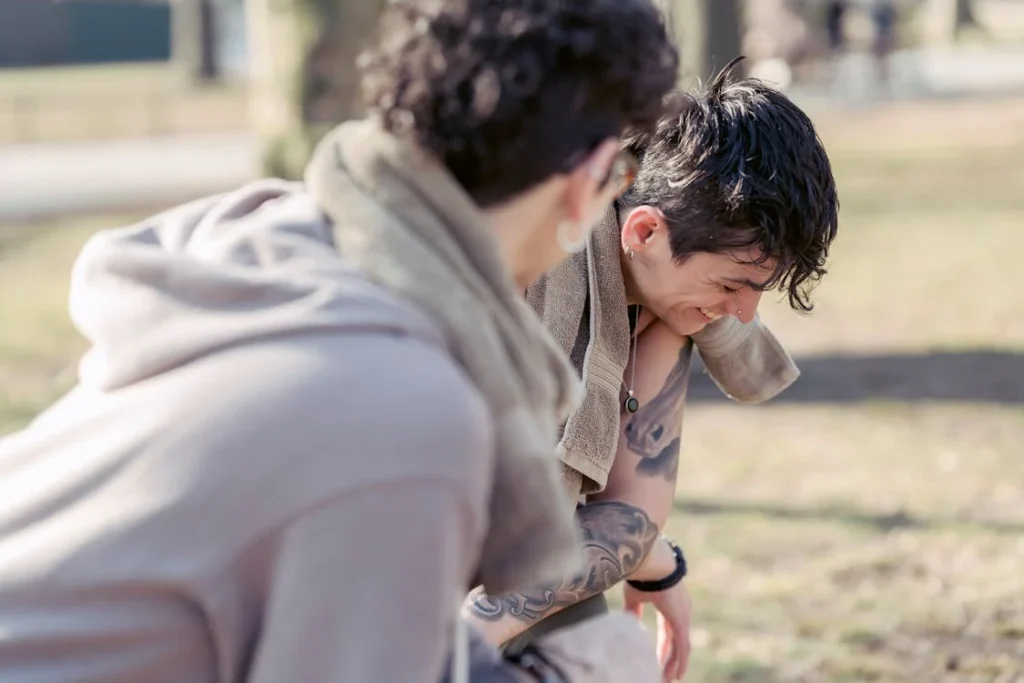Losing a limb is a life-changing event. It can bring physical challenges, emotional struggles, and moments of deep frustration. But amidst all these difficulties, one powerful tool can make a real difference—laughter. Humor and laughter therapy can help amputees cope with stress, improve their mental health, and even aid in physical recovery.
Laughter is more than just a reaction to something funny. It is a natural way to relieve stress, reduce pain, and bring people together. Science shows that when you laugh, your body releases endorphins—natural chemicals that make you feel good. These endorphins not only improve mood but also help in pain management. For amputees, finding ways to laugh and enjoy humor can be an essential part of healing.

The Science Behind Laughter and Healing
Laughter is often described as the best medicine, but for amputees, it is more than just a saying—it is a powerful tool for healing. When a person laughs, the brain releases feel-good hormones called endorphins.
These hormones act as natural painkillers, reducing discomfort and creating a sense of well-being. For someone who has undergone an amputation, managing pain is a daily struggle, and laughter provides a simple, drug-free way to ease some of that burden.
Beyond pain relief, laughter also helps reduce stress. The process of recovering from an amputation can be overwhelming. There are physical adjustments, emotional struggles, and sometimes even financial worries related to prosthetic care.
Stress can make these challenges even harder to handle, leading to anxiety and depression. But when a person laughs, the body lowers its levels of cortisol, the hormone responsible for stress.
This reduction creates a sense of relaxation and lightness, helping amputees approach their recovery journey with a more positive mindset.
Another important effect of laughter is its ability to improve circulation and boost immunity. When a person laughs, their heart rate and oxygen levels increase, similar to mild exercise.
This helps improve blood flow, which is essential for healing wounds and keeping the body strong. Many amputees experience circulation issues, especially in the residual limb, and laughter can provide a natural way to enhance overall health.
Additionally, laughter strengthens the immune system by increasing the production of antibodies and activating protective cells that help fight infections.
This means that staying engaged with humor and laughter can contribute to better overall health, reducing the risk of illness and promoting faster healing.
Emotional Strength Through Humor
The emotional impact of limb loss is just as significant as the physical challenges. Many amputees experience feelings of grief, frustration, and even anger.
There is a sense of loss, not just of the limb but of certain abilities and routines that once felt natural. Humor provides a unique way to navigate these emotions.
When a person laughs at a situation, they are not ignoring the problem—they are taking control of it. Humor allows amputees to reframe their experiences, shifting their perspective from one of loss to one of adaptability.
Instead of focusing on what has been taken away, humor can help highlight new possibilities. Many amputees who embrace humor find that it changes how they view themselves.
Instead of feeling like a victim of their circumstances, they begin to see themselves as resilient and capable.
Another way humor helps is by making difficult conversations easier. People around an amputee may feel unsure of how to talk about their condition, afraid of saying the wrong thing or causing discomfort.
When an amputee uses humor, it creates an inviting atmosphere that encourages open conversations. Instead of feeling awkward or avoiding the topic, people become more comfortable, leading to stronger connections and support.

How Laughter Helps in Social Connections
Losing a limb can sometimes feel isolating. Many amputees worry about how others perceive them or struggle with confidence in social settings. Humor plays a vital role in breaking down these barriers and rebuilding connections.
When people laugh together, it creates an immediate sense of closeness. Shared laughter removes tension, making social interactions feel natural rather than forced.
Amputees who use humor to talk about their experiences often find that it helps others feel more comfortable around them.
Instead of avoiding conversations or treating the situation as something tragic, humor allows people to see the amputee as a whole person rather than focusing on their limb loss.
For example, some amputees make jokes about their prosthetics, turning what could be an uncomfortable topic into something lighthearted. This not only helps others relax but also empowers the amputee, showing that they are in control of their own narrative.
Beyond everyday interactions, humor helps build lasting relationships. Whether it is with family, friends, or even new acquaintances, laughter creates bonds that go beyond physical differences.
It makes conversations flow more easily and strengthens connections by creating positive shared memories. Many support groups for amputees incorporate humor as a way to make meetings more enjoyable.
Instead of focusing only on struggles, they celebrate victories, share funny experiences, and create an environment where people feel truly accepted.
The Role of Laughter in Rehabilitation
Rehabilitation after amputation is both a physical and mental journey. Learning to use a prosthetic limb, adjusting to new ways of moving, and regaining independence can be challenging.
Laughter and humor can make this process easier by reducing stress and frustration. When a person laughs, their muscles relax, which can help improve movement and coordination.
This is particularly important for amputees who are learning to use a prosthetic device. When the body is tense, movements can feel rigid and unnatural. However, when a person laughs, they become more flexible and willing to try again after setbacks.
Gamified rehabilitation is one way to incorporate humor into recovery. At Robobionics, we emphasize making rehabilitation enjoyable and engaging. Instead of viewing therapy as a chore, laughter can transform it into a rewarding experience.
Virtual reality exercises, interactive games, and lighthearted challenges can make the learning process fun while still being effective. When an amputee enjoys their therapy sessions, they are more likely to stay motivated and committed to progress.
Another way humor supports rehabilitation is by reducing fear. Many amputees feel nervous about using their prosthetics, afraid of falling, failing, or looking awkward.
Laughter helps ease these fears. When someone can laugh at small missteps, they are less likely to dwell on failures and more likely to keep pushing forward. Physical therapists often use humor to encourage patients, helping them stay positive even when progress feels slow.

Finding Humor in Everyday Life
For many amputees, the idea of using humor might not come naturally at first. After all, losing a limb is a serious and life-changing event. But humor is not about making light of struggles—it is about finding moments of joy, even in difficult times.
By embracing laughter in daily life, amputees can shift their focus from what has changed to what is still possible.
One of the simplest ways to bring humor into everyday life is by watching or listening to things that make you laugh.
Whether it is a favorite comedy show, a stand-up routine, or funny podcasts, engaging with lighthearted content can instantly lift the mood. Laughter is contagious, and surrounding yourself with things that make you smile can create a habit of joy.
Interacting with others in a playful way also helps. Some amputees enjoy using humor to address their condition with friends and family.
For example, making a lighthearted joke about a prosthetic limb or coming up with funny responses to curious questions can turn awkward situations into shared laughter. Instead of feeling like an outsider, humor makes social interactions more comfortable and enjoyable.
Many amputees also find humor in their everyday experiences. Unexpected moments, such as a prosthetic limb making an unusual sound or struggling with something in a funny way, can become great stories to share.
When approached with the right mindset, these moments become part of life’s unique and unpredictable journey rather than frustrations.
Some amputees even create social media content or write blogs about their humorous experiences, helping others see the lighter side of challenges.
The Connection Between Humor and Confidence
Confidence plays a crucial role in an amputee’s journey. Many people struggle with body image after losing a limb, feeling self-conscious or worried about how others perceive them.
Humor can be a powerful tool in overcoming these feelings. When a person learns to laugh at their situation, they take control of their own story instead of letting fear or insecurity shape it.
Using humor as a way to engage with the world creates a sense of empowerment. Instead of hiding or feeling ashamed, laughing openly shows self-acceptance.
Others pick up on this confidence, and it changes how they respond. When an amputee approaches life with humor, people see their personality first rather than just focusing on their physical condition.
Humor also helps in dealing with moments of self-doubt. Everyone has bad days, and amputees are no exception. But being able to step back, find a reason to smile, and remind oneself that challenges do not define them can make all the difference.
Instead of getting stuck in negative emotions, humor provides a way to move forward with strength and optimism.

Using Laughter to Overcome Difficult Moments
Every amputee faces moments of frustration, sadness, or self-doubt. Whether it is struggling with a prosthetic, dealing with phantom limb pain, or feeling left out in social situations, difficult moments are part of the journey.
But laughter can be a powerful way to navigate these challenges. It does not erase the hardships, but it does make them easier to handle.
When faced with frustration, humor can be a form of release. Instead of allowing small setbacks to become overwhelming, finding something funny in the situation can break the tension.
Many amputees have shared stories of their prosthetic limbs falling off in unexpected places or struggling with simple tasks in amusing ways. Instead of feeling embarrassed, they choose to laugh, making these moments feel less like failures and more like part of life’s unpredictability.
Phantom limb pain is another challenge that humor can help with. While it is a real and sometimes severe condition, studies have shown that distraction techniques, including humor, can reduce its intensity.
Watching a funny video, engaging in playful conversations, or even finding ways to joke about the sensation can shift focus away from the pain. It might not be a cure, but it is an effective way to make difficult moments more manageable.
Humor also helps in dealing with public reactions. People can sometimes be insensitive or ask awkward questions about an amputation. Instead of feeling hurt or frustrated, using humor can turn these encounters into something positive.
For example, responding to a curious stranger with a funny remark about being a “cyborg in training” can lighten the mood and take control of the conversation. It not only eases tension but also helps educate others in a friendly way.
The Role of Community and Shared Laughter
Laughter is even more powerful when shared. Being part of a supportive community—whether it is friends, family, or other amputees—can make a huge difference.
When people laugh together, it creates a sense of belonging. No one wants to feel like they are facing challenges alone, and humor helps build bonds that make life’s difficulties easier to bear.
Amputee support groups often encourage laughter as part of healing. Sharing funny stories, joking about shared experiences, or simply enjoying time together in a relaxed environment creates emotional strength.
Many amputees say that the first time they were able to joke about their limb loss with someone who understood was a turning point in their recovery. It marked the moment they stopped seeing themselves as broken and started embracing their new reality with confidence.
Even outside of support groups, finding people who bring laughter into life is important.
Whether it is a best friend who always knows how to make you smile or a family member who finds humor in any situation, surrounding yourself with positive and lighthearted people can make a world of difference.

How Laughter Supports Long-Term Well-Being
Healing from limb loss is not just about the initial recovery—it is a lifelong journey. As time goes on, new challenges may arise, whether it is adjusting to a new prosthetic, dealing with physical strain, or navigating changes in lifestyle.
Laughter remains a valuable tool in maintaining long-term emotional and mental well-being.
One of the biggest long-term benefits of laughter is its ability to prevent burnout. Constantly focusing on recovery, mobility, and prosthetic care can be exhausting.
Humor provides a necessary break from the seriousness of daily challenges. By incorporating laughter into everyday life, amputees can maintain a balance between working towards their goals and enjoying the present moment.
Self-acceptance is another area where humor plays a significant role over time. The journey of embracing limb loss does not happen overnight.
There may be moments of self-doubt, but humor helps create a more positive relationship with one’s own body. Over time, the ability to laugh at small struggles—like an unexpected stumble or a prosthetic behaving unpredictably—reinforces self-confidence rather than insecurity.
Laughter also keeps relationships strong. Whether it is with a spouse, family members, or friends, maintaining social connections is essential for mental well-being.
Amputees who use humor in their relationships often find that it strengthens their bonds. It encourages open communication, lightens difficult conversations, and makes everyday interactions more enjoyable.
A shared laugh can dissolve tension, helping both the amputee and their loved ones navigate challenges together.
Embracing a Lighter Outlook on Life
One of the most powerful effects of humor is the shift in perspective it creates. Amputees who actively use laughter to cope with challenges often develop a greater sense of resilience.
Instead of seeing difficulties as roadblocks, they view them as part of a larger journey. This lighter outlook does not mean ignoring struggles—it means choosing to focus on joy, progress, and the ability to adapt.
Many successful amputees, from athletes to motivational speakers, credit humor as a key part of their mindset. They see their prosthetics not as limitations but as extensions of themselves.
By laughing at the little things, they prove that they are more than their amputation. They inspire others to do the same.
For those just beginning their journey, it is important to remember that laughter is not about pretending everything is okay. It is about finding reasons to smile despite the difficulties. Even on hard days, a funny memory, a playful moment with a loved one, or a humorous take on a frustrating situation can provide a much-needed sense of relief.
At Robobionics, we understand that prosthetics are more than just physical tools—they are part of a person’s journey to independence and confidence.
That is why we encourage a holistic approach to recovery, where mental well-being is just as important as physical rehabilitation.
By embracing humor and laughter, amputees can take control of their narrative, find joy in their journey, and move forward with strength and positivity.

The Role of Humor in Personal Growth and Identity
Limb loss is not just a medical event; it reshapes identity in ways that go beyond the physical. Many amputees go through a process of rediscovery, learning who they are in a new way. Humor plays a key role in this transformation by helping individuals accept, adapt, and grow.
After an amputation, it is common to feel a sense of disconnect from one’s body. The way a person moves, the things they can do, and even the way they see themselves may change. Humor bridges this gap by turning moments of awkwardness into moments of empowerment.
For example, an amputee struggling to master a new prosthetic may feel frustrated at first, but finding humor in the process—laughing at a clumsy misstep or joking about “robotic upgrades”—can ease the adjustment period.
Instead of feeling defeated, humor turns the experience into something manageable and even fun.
Many amputees also discover a new sense of confidence through humor. A person who once felt self-conscious about their limb loss may start using humor to take control of how others perceive them.
Instead of waiting for people to feel comfortable, they create comfort through laughter. This approach allows amputees to shape their own identity rather than letting society’s expectations define them.
Some even develop a signature style of humor that becomes part of their personality, making them more approachable and self-assured.
Beyond social interactions, humor helps amputees explore new possibilities in life. It encourages them to step outside their comfort zones, try new activities, and embrace challenges with a positive mindset.
Someone who once feared being stared at might eventually enjoy making people laugh, using humor as a way to break the ice. Others may find that humor leads them to new passions, whether it is comedy, public speaking, or advocacy.
Humor as a Tool for Motivation
One of the most powerful effects of humor is its ability to keep people motivated. The journey of an amputee does not stop at recovery—it is an ongoing process of learning, adapting, and pushing boundaries. There will always be moments of struggle, but laughter keeps the spirit alive.
Athletes with limb loss often use humor to stay motivated during training. Instead of focusing on limitations, they make jokes about their prosthetics, race against able-bodied friends, or turn small challenges into personal victories.
This mindset helps them push through setbacks and stay excited about progress. The same principle applies to everyday life.
Whether it is mastering a new task, learning to drive with modifications, or simply getting through a tough day, humor adds an element of fun to the process.
Laughter also keeps the mind resilient. When an amputee faces a setback—whether it is a malfunctioning prosthetic, a difficult rehab session, or an insensitive comment from a stranger—humor provides a way to bounce back.
It reminds them that challenges do not define them and that every obstacle is just another part of the adventure.
Conclusion
Laughter is a powerful force that helps amputees cope with challenges, rebuild confidence, and embrace life with positivity. It is not about ignoring difficulties but about facing them with strength and resilience. Humor eases pain, reduces stress, and strengthens social connections, making recovery and adaptation feel less overwhelming.
By finding joy in everyday moments, sharing laughter with loved ones, and using humor to take control of their narrative, amputees can redefine their experience. Whether it is through playful jokes, lighthearted conversations, or simply learning to smile at life’s unpredictability, laughter transforms the journey from one of struggle to one of empowerment.
At Robobionics, we believe that recovery is about more than just physical healing—it is about building confidence, independence, and joy. That is why we encourage amputees to explore not only advanced prosthetic solutions but also the emotional strength that comes with laughter. If you are on this journey, remember: your story is yours to shape, and humor can be one of your greatest tools.
Want to learn how gamified rehabilitation and prosthetic solutions can support your journey? Contact us today and take the next step toward a confident, laughter-filled life!



